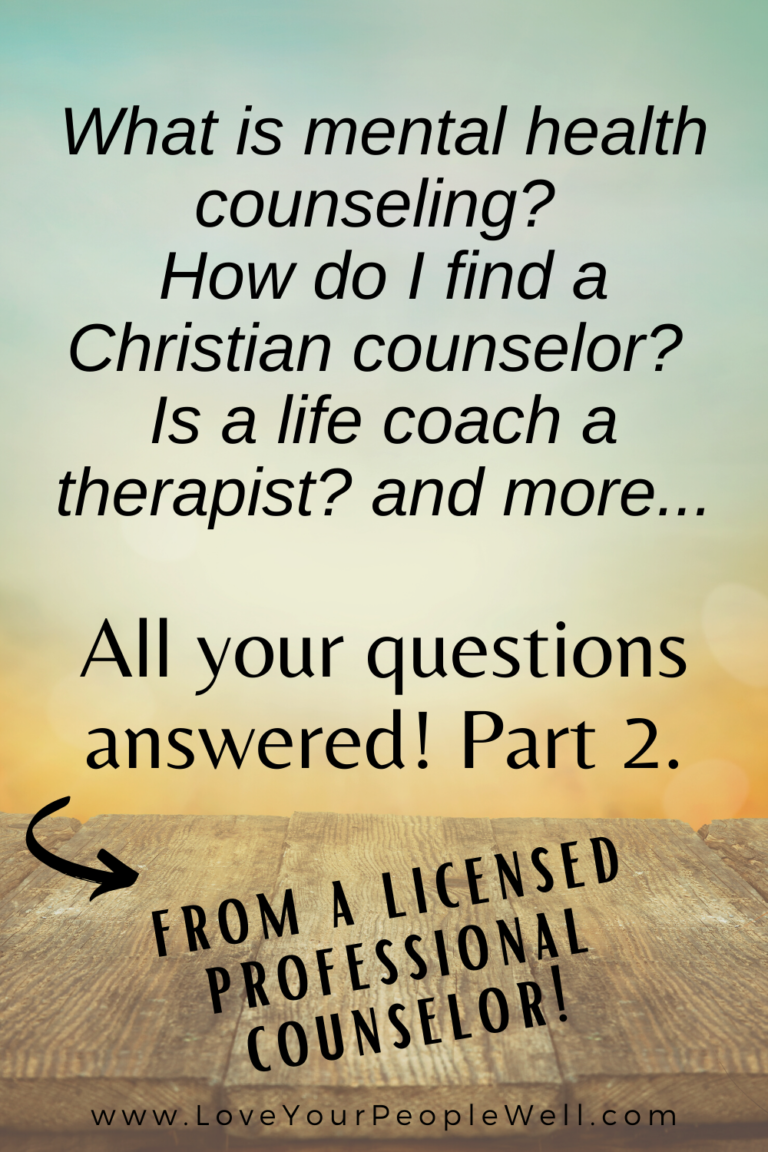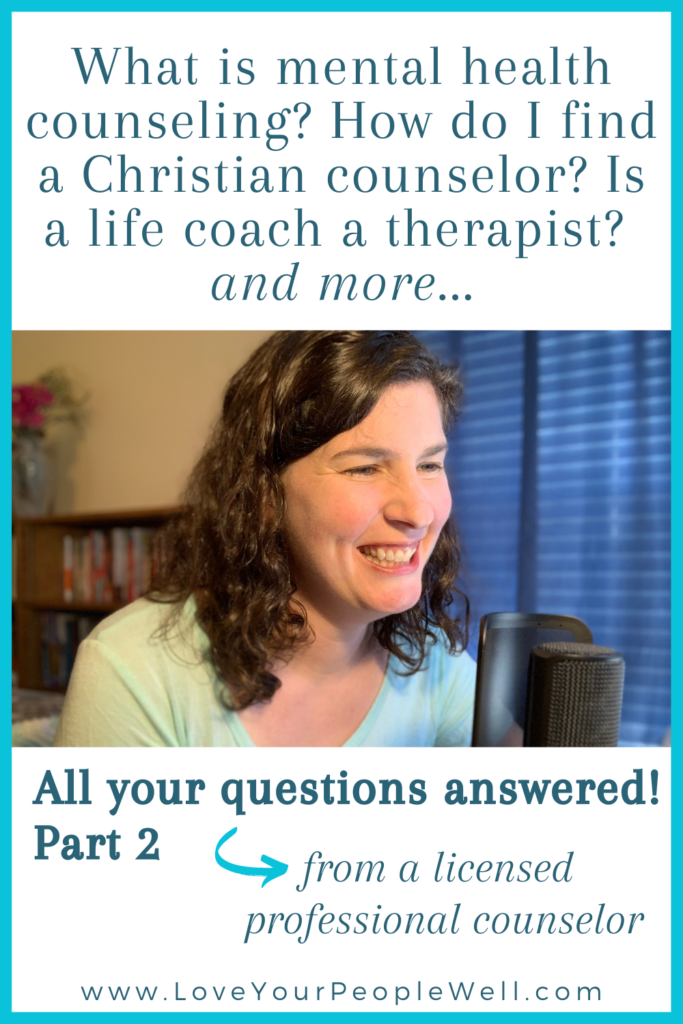What are we talking about today?
Have you thought about seeking mental health support? Finding a therapist? Sitting down for some counseling sessions?
This podcast episode is for you.
Today is Part 2 of a quick mini-series to answer common questions about the counseling process.
Make sure that you circle back to listen to Part 1 where we talked about when people often seek counseling, what different professionals are available (life coach? therapist? psychiatrist? biblical counselor?), and how Christians should think about starting the counseling process.
In today’s episode (part 2), we’re moving forward to discuss:
- How can you find a great therapist?
- What is necessary in order for the counseling process to be helpful?
- What should you expect in the first few counseling sessions?
This is good stuff, my friend. There is a detailed summary below, but you’ll get the most from listening to the episode. I am a licensed therapist, and I’m excited to jump into these questions with you!
With that in mind… let’s dive in.
Listen to Episode 33:
[This post may contain affiliate links. If a purchase is made, I may receive a small commission at no extra charge to you.]
Snag your resources here!
I have several FREE resources that may be helpful to you as you consider your mental health, emotional wellness, and the possibility of professional support.
- Sign up for my free 5-day email course and (in only 10 minutes a day!) learn the 5 Tools Every Busy Mom Needs to Move Her Family From Autopilot to Intimacy.
- Grab a copy of your free Conflict Resolution Checklist.
- Check out the 51 Self Care Ideas List.
- Strengthen your spiritual growth with the Holy Habits: 45 Day Prayer & Bible Challenge.
My Recommended Resources page will also be very helpful, especially if you have thought about counseling for a particular struggle. Books are a fabulous starting place for ideas, help, and healing, and I have links to all of my favorites that I recommend frequently in the counseling room.
As I mention in the podcast episode, mental health emergencies and serious safety issues should be taken seriously. Contact your local emergency room or police for help. The Suicide Prevention Lifeline number is 1-800-273-8255 or you can chat with them online at https://suicidepreventionlifeline.org.
Check out The Hope Planner

Once you start counseling, you will find it useful to process what you’re learning… even outside of the counseling room! I recommend The Hope Planner. It is a useful tool for keeping track of what God is doing in the counseling room, so you can be processing and praying throughout the week.
The Hope Planner is part weekly planner (and they have a daily planner also, but I use the weekly version) and part prayer journal. I use it, and love it, and highly recommend it.
Check out The Hope Planner.

[This post may contain affiliate links. If a purchase is made, I may receive a small commission at no extra charge to you.]
Today's Episode Highlights
Okay. First things first: if you didn’t listen to Part 1 of this series yet, go back and listen now! It is a really helpful foundation for today’s discussion.
As we get started, please remember that I am a licensed therapist, but this podcast episode (and all resources from Love Your People Well LLC) are informational, not professional counseling or personal advice. (Read my disclaimer policy here.)
Also, I am sharing this information from my personal experience as a licensed mental health therapist in the United States! If you are from outside the States, you may have a different process in seeking help in the mental health world. Even the different states within the U.S. sometimes have different processes. So, if you are seeking counseling for yourself, you may find your local process a little bit different.
5 things to consider as you find a new counselor
If one of the biggest questions in the mental health counseling process is wondering if you need or want counseling… the next big question is: “How do I find the right counselor?”
To answer this question, let’s look at the five things that you need to consider.
- Emotional
Make sure that you feel comfortable with this person. They should be non-judgmental, kind, compassionate, and have an approach to counseling that feels helpful for you. Research shows that the bond between therapist and client is the biggest influence on how helpful the overall counseling process is for the client (… that’s you!).
- Financial
Sometimes, we only want a few counseling sessions. But sometimes, we need several months or even years of counseling. Make sure that you consider the financial aspect before deciding on a new counselor.
- Location
Similar to the financial considerations, make sure that you can access your counselor in your regular life. If they are all the way across town, you may cancel more often than you’d like.
Personally, I do not have much experience with tele-therapy or online therapy. There are certainly benefits of being physically in the room together for the counseling process! But I am not speaking here about the pros and cons of tele-therapy or giving suggestions specifically for online therapy. I will need to do more research in this area before making recommendations here.
- Training
Make sure that you know enough about your potential counselor to know that they have the expertise to help with your unique situation. Some counselors do not work frequently with couples, and therefore – while they may be a fabulous counselor for your friend – they might not be a great fit for you and your husband to seek marriage counseling.
There are many certifications and additional trainings available for counselors in the mental health field. If you have a specific treatment issue such as trauma healing or substance use/addiction issues, make sure that you find a therapist who is trained and prepared to help in these areas.
- Faith
As I mentioned in Part 1 of this mini-series, you will find the counseling process much more helpful if you are working with a counselor who respects your Christian beliefs.
Some people specifically want the Bible and prayer to be included in the counseling process. Others specifically do not want that included. And still others are ambivalent, prioritizing instead the situation or issue that is bringing them into counseling.
There is no right or wrong here. Thanks to God’s common grace, many people find healing and growth working with a non-Christian counselor.
My biggest piece of advice here is to make sure that you are selecting a therapist who is respectful of your Christian beliefs. Make sure that that they are willing to take your values and beliefs seriously and avoid recommendations that go against God’s Word.
How to find a great counselor
As you consider the five points about, here are my suggestions for how to find a counselor:
- First, talk to your pastor and/or friends for their personal recommendations.
Yes, there are situations where this would be unhelpful or not possible. But generally, your pastor is there to help you, support you, and pray with you. The local church is a great place for finding local recommendations for a mental health therapist. Similarly, if your friends have found a specific therapist helpful for them, that is a good starting place for you.
- If finances are a specific consideration for you, look into your health insurance coverage.
At the time of this episode (Summer 2021, in the U.S.A.) insurance companies are required to provide some level of mental health coverage. They will provide a document, typically accessible online, that will tell you want to expect financially and which lists in-network counselors whom you could contact.
In my experience, if you are using insurance coverage to help pay for your counseling sessions, your counselor will be required to give you a diagnosis. Some professionals, such as a life coach or a pastoral counselor, are therefore unlikely to be covered by health insurance.
(Your local health insurance coverage options may, of course, look different.)
- If you are still looking for a good therapist, check an online Christian database for a local counselor.
There are many databases online that will provide information about local counselors for you to contact. If you are a Christian, I recommend two resources here:
Check the Christian Counselors Network from Focus on the Family (who also offers a Hope Restored intensive marriage program). When I was personally still seeing clients, I was a part of this database. It was a very thorough application process!
Check the Christian Care Connect network through the American Association of Christian Counselors. This is a newer database, so I was not a part of it myself, though I am a member of the AACC. The AACC has been around for decades and has members worldwide.
Don't forget to circle back to Part 1 of this conversation about mental health counseling!
In Part 1, we answered questions about when counseling might be helpful for someone, what the different definitions and options are for professionals to work with (life coach? therapist? psychiatrist? biblical counselor?), and how Christians should think about mental health counselor.
These two episodes were made to go hand-in-hand. Yes, they can stand alone, but you’ll get the most value from listening to the full two-part series.
Hey, before you go!
- Make sure you SUBSCRIBE to the podcast, so you don’t miss any future episodes.
- Share this episode with a friend who needs to hear it: you can text or email the link to her.
- Did this episode help you? Do you have questions or thoughts about what I shared today? Let’s me know! Send me a message on Instagram or Facebook.
Don't miss future episodes!
Subscribe now:
A reminder of the Disclaimers & Disclosures Policy: I am an affiliate with many of the resources I recommend, which means I may receive a small commission if you make a purchase through my provided links. I never recommend products I don’t love! Also, I am a licensed therapist but this podcast is not therapy. It is not professional or personal advice to your specific situation. Get info about professional counseling here.




